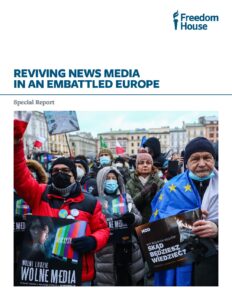For over a decade, a series of crises have undermined the media’s ability to support democracy. Traditional business models have collapsed with the rise of the internet and social media platforms. Hyperpartisan news sites and disinformation have damaged readers’ trust in online content. At the same time, illiberal leaders in several democracies have developed sophisticated methods for silencing and co-opting the media.
These serious challenges have sparked new and ambitious approaches for sustaining journalism. Driven by necessity, a dynamic group of European media organizations are developing alternative business models, strengthening the craft of journalism, engaging younger and more diverse audiences, and building networks to defend against legal attacks. While their stories are distinct, lessons learned from their successes can inform future policy approaches to reviving independent media amid the twin forces of democratic backsliding and digital disruption.
Freedom House conducted in-depth research and interviews with nearly 40 media professionals and experts in six countries: Estonia, France, Germany, Hungary, Italy, and Poland. The countries vary by market size and by the health of their democracy, but all are part of the European Union (EU), where members are debating important regulatory measures to protect media independence and pluralism under a proposed European Media Freedom Act. Freedom House examined four conditions affecting the playing field for independent news media and their role in democracy: their ability to sustain themselves financially, reach and engage diverse audiences, earn public trust, and play a watchdog role.


